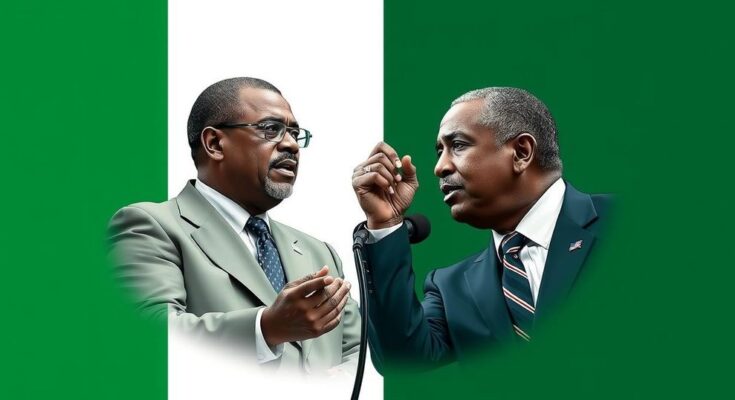The article examines the impact of the recent U.S. presidential election through the lens of a Nigerian journalist who parallels his experiences in Nigeria’s political landscape. It reflects on the disappointment of election outcomes, the importance of respecting differing opinions, and the urgent need for unity amidst rising societal tensions, drawing comparisons between political leaders in both nations. Ultimately, it advocates for humility and constructive discourse as essential for healing and cooperation post-election.
In the aftermath of the recent U.S. presidential election, individuals, particularly those who are disappointed by the outcome, must adjust to the reality of the results. Having experienced a similar situation during Nigeria’s 2015 elections, where I supported Goodluck Jonathan against Muhammadu Buhari, I understand the difficulty of this process. Jonathan’s loss marked the beginning of Buhari’s controversial presidency, characterized by unmet promises and escalating issues within Nigeria, leading me ultimately to leave for the United States.
As I followed last year’s tumultuous Nigerian election between Peter Obi and Bola Tinubu, I found myself rooting for Obi, whose ethos was seen as a refreshing contrast to the existing political climate. Like many Nigerians, I believed Obi represented a potential shift toward better governance, deserving of support, which I demonstrated through a financial contribution to his campaign. Unfortunately, Obi’s unexpected defeat and the allegations surrounding the election process further deepened my sense of frustration and disenchantment.
The Supreme Court’s dismissal of Obi’s appeal seemed a sign of the deteriorating political landscape in Nigeria, which mirrors certain sentiments observed in the U.S. election. As Emmanuel Ogebe, a Washington-based lawyer, articulated, recent political developments have instilled a lack of trust both in Nigeria and the U.S., as individuals wade through a swamp of corruption and questionable ethical standards among candidates like Bola Tinubu and Donald Trump.
Much like the sentiment shared regarding Tinubu’s alleged misconduct, Trump faced significant legal challenges yet emerged victorious in his election bid. Ogebe’s reflections about the erosion of moral values resonate deeply in discussions regarding leadership integrity on both sides of the Atlantic.
As Nigeria grapples with the ramifications of Tinubu’s presidency, which has exacerbated economic strife and deepened societal divides, the parallels with the United States become increasingly relevant. The public’s response to election outcomes hinges largely on respect, humility, and a commitment to rebuilding trust among divided groups, a challenge both nations currently face amidst heightened tensions and inflammatory rhetoric. Embracing a more conciliatory approach may pave the way for healing and recovery, allowing societies to work collaboratively towards overcoming their respective hardships.
The article provides a comparative analysis of the post-election atmosphere in Nigeria and the United States, illustrating the shared frustrations of citizens facing the aftermath of contested elections. It reflects on the author’s personal experiences and observations as a Nigerian journalist who has lived through electoral disappointments. The discussion touches upon the broader themes of electoral integrity, disillusionment with political promises, and the implications of recent elections on societal cohesion in both Nigeria and the United States.
The narrative highlights the necessity for citizens to come to terms with electoral outcomes and seek pathways toward unity and respect, despite differences in political outcomes. Both Nigeria and the United States face significant challenges in rebuilding trust and fostering a collaborative environment post-election. The call for humility and a change in attitude serves as a reminder that overcoming societal divides requires concerted efforts towards understanding and reconciliation.
Original Source: baptistnews.com




